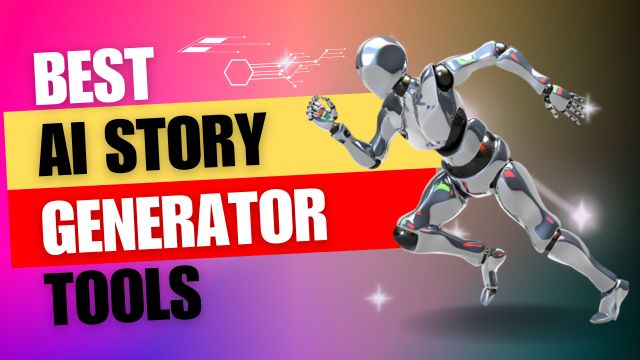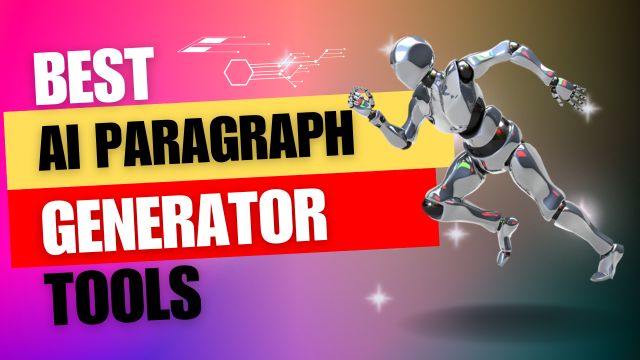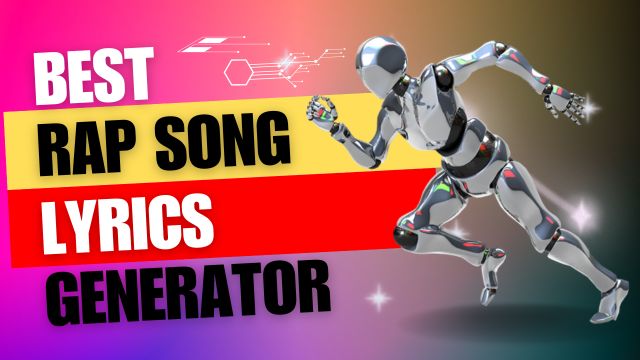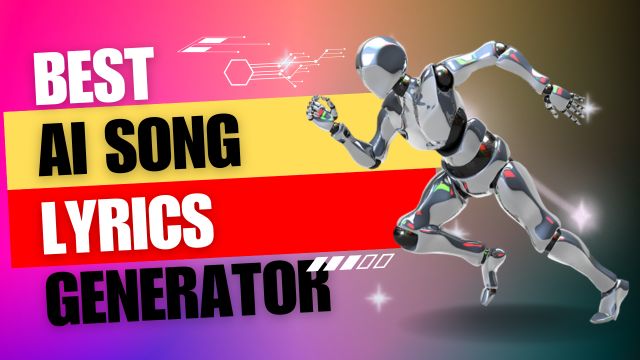
The world of storytelling is undergoing a remarkable transformation, thanks to the advent of AI technology. Imagine having an intelligent assistant at your fingertips, capable of conjuring up engaging plot twists, vivid characters, and captivating narratives with just a few clicks. Welcome to the future of writing, where AI story generators are revolutionizing the creative process for writers and storytellers around the globe. The purpose of this blog post is to highlight the top 5 AI story generator available today.

AI story generators are sophisticated tools that utilize artificial intelligence and machine learning to help writers create unique and compelling stories. By analyzing vast amounts of text and understanding the intricacies of language and narrative structure, these tools can generate stories that are both coherent and imaginative. As these technologies continue to evolve, they are becoming increasingly popular among writers of all levels—from novices looking for inspiration to seasoned authors seeking to overcome writer’s block.
Table of contents
What is an AI Story Generator?
An AI story generator is a software tool that uses artificial intelligence, particularly natural language processing (NLP) and machine learning algorithms, to create written stories. These generators can produce narrative content based on user inputs such as prompts, keywords, or themes.
One Minute. If you are also interested in AI Song Lyrics Generator. You can check below articles:
1. 5 Best AI Song Lyrics Generator for Songwriting Inspiration
2. 5 Best Rap Lyrics Generators to Elevate Your Songwriting
How Does an AI Story Generator Work?
AI story generators are sophisticated tools that use artificial intelligence, particularly natural language processing (NLP) and machine learning, to create coherent and engaging stories based on user inputs. Here’s a detailed look at the mechanics behind how these tools function:
1. Data Collection and Training
Large Datasets:
AI story generators are trained on vast amounts of textual data, including books, articles, short stories, and other narrative forms. This diverse dataset allows the AI to understand different writing styles, genres, and narrative techniques.
Training the Model:
Using machine learning algorithms, the AI processes this data to recognize patterns, structures, and language usage. This process involves teaching the AI to predict the next word or sentence based on the context of the previous text, enabling it to generate coherent and contextually relevant stories.
2. Natural Language Processing (NLP)
Understanding Context:
NLP is crucial for the AI to understand the context and semantics of the input provided by the user. It helps the AI to grasp the meaning behind words and sentences, ensuring that the generated text is logical and flows naturally.
Language Generation:
Once the AI understands the input, it uses NLP techniques to generate new text. This involves constructing sentences, paragraphs, and entire narratives that are grammatically correct and contextually appropriate.
3. User Input and Customization
Prompts and Keywords:
Users typically start by providing a prompt, which can be a single sentence, a few keywords, or a detailed outline. This input serves as the foundation for the AI to build the story.
Customization Options:
Many AI story generators offer customization features, allowing users to specify the tone, style, length, and genre of the story. This helps tailor the output to the user’s specific needs and preferences.
4. Text Generation Process
Predictive Text Generation:
The AI uses the input prompt and its training data to predict and generate subsequent words, sentences, and paragraphs. It leverages the learned patterns from the training phase to ensure the story remains coherent and engaging.
Iteration and Refinement:
The AI may go through several iterations to refine the generated text, ensuring it aligns with the user’s input and the desired narrative structure. This iterative process helps in producing high-quality and polished stories.
5. Output and Feedback
Real-Time Generation:
Most AI story generators can produce text in real-time, providing immediate outputs that users can read, edit, and refine. This makes the tool highly efficient for brainstorming and rapid content creation.
User Feedback:
Many AI story generators allow users to provide feedback on the generated text. This feedback helps the AI improve its performance over time, making future outputs more accurate and tailored to user preferences.
6. Advanced Features
Interactive Storytelling:
Some AI story generators, like AI Dungeon, offer interactive storytelling experiences where users can input actions and decisions, influencing the direction of the narrative. This creates a dynamic and engaging storytelling process.
Collaboration and Sharing:
Platforms like RapPad include collaborative features, allowing multiple users to work on a story together. This fosters a sense of community and enhances the creative process through shared ideas and feedback.
Why Should Writers Use AI Story Generators?
AI story generators offer a range of benefits that can enhance the writing process, spark creativity, and improve productivity. Here are several compelling reasons why writers should consider using AI story generators:
1. Overcoming Writer’s Block
Inspiration:
AI story generators can provide fresh ideas and new directions for stories, helping writers overcome creative blocks. By generating prompts, story starters, and plot twists, these tools can reignite a writer’s creativity and get the words flowing again.
Continuous Flow:
When a writer is stuck on a particular scene or chapter, an AI story generator can suggest the next segment of the story, allowing the writer to maintain momentum and continue writing without prolonged pauses.
2. Rapid Content Creation
Efficiency:
AI story generators can quickly produce large volumes of text, making them ideal for writers who need to generate content rapidly. This is particularly useful for meeting deadlines, producing serialized content, or maintaining a consistent writing schedule.
First Drafts:
Writers can use AI story generators to create first drafts, which they can then refine and polish. This saves time and allows writers to focus on enhancing the quality and depth of the narrative.
3. Experimentation and Creativity
Exploring New Ideas:
AI story generators allow writers to experiment with different genres, styles, and plotlines. By inputting various prompts, writers can explore unconventional ideas and discover new creative possibilities.
Diverse Perspectives:
AI can offer unique perspectives and story angles that a writer might not have considered. This can add depth and variety to a writer’s work, making their stories more engaging and innovative.
4. Learning and Skill Development
Understanding Story Structure:
For novice writers, AI story generators can serve as educational tools. By analyzing the generated content, writers can learn about effective narrative structures, character development, and plot progression.
Improving Writing Skills:
Interacting with AI-generated content can help writers identify areas for improvement in their own writing. It provides a reference point for grammar, style, and storytelling techniques, enabling writers to hone their craft.
5. Customization and Personalization
Tailored Content:
Many AI story generators offer customization options, allowing writers to specify the tone, style, length, and genre of the story. This ensures that the generated content aligns with the writer’s vision and needs.
Flexibility:
Writers can use AI tools for various stages of the writing process, from brainstorming and outlining to drafting and editing. This flexibility makes AI story generators versatile companions for any writing project.
6. Enhanced Productivity
Focus on Creativity:
By handling some of the more mechanical aspects of writing, AI story generators free up writers to focus on the creative aspects of their work. This can lead to higher quality and more imaginative stories.
Streamlined Process:
AI story generators can streamline the writing process, reducing the time and effort needed to develop complex narratives. This allows writers to produce more content in less time.
7. Collaborative Opportunities
Co-Writing:
AI story generators can act as co-writers, providing suggestions and feedback that enhance the collaborative writing experience. This can be particularly beneficial for writers working on joint projects or looking for a partner to bounce ideas off.
Community Engagement:
Some platforms, like RapPad, offer community features where writers can share their AI-generated content and receive feedback from other users. This fosters a sense of community and encourages collaborative creativity.
5 Best AI Story Generators
Artificial intelligence has made significant strides in the realm of creative writing, including story generation. Whether you’re an author looking for inspiration, a student working on a creative writing project, or simply a storytelling enthusiast, AI story generators can help spark creativity and develop unique narratives. Here are five of the best AI story generators available today:
1. OpenAI’s GPT-3
OpenAI’s GPT-3 is one of the most advanced language models in the world, renowned for its ability to generate coherent and compelling stories. With GPT-3, users can input a prompt or a few sentences, and the AI will create a detailed story based on that input. Its vast training data allows it to produce narratives across a wide range of genres and styles.
Features:
- Generates detailed and coherent stories
- Adaptable to various genres and styles
- Requires minimal input to produce extensive content
How to Use:
- Provide a prompt or a few sentences to start your story
- Let GPT-3 generate the continuation
- Edit and refine the generated content to suit your needs
2. Sassbook AI
Sassbook AI is a versatile writing assistant that excels in generating stories. It offers a user-friendly interface and customizable settings, allowing writers to influence the tone, style, and length of the generated stories. Sassbook AI is particularly useful for those who need a quick burst of creativity to overcome writer’s block.
Features:
- Customizable settings for tone, style, and length
- User-friendly interface
- Quick generation of creative and engaging stories
How to Use:
- Enter your story prompt and adjust the settings
- Generate story segments and review them
- Combine and edit the segments to create a cohesive narrative
3. Plot Generator
Plot Generator is a fun and interactive tool designed to help writers generate creative story ideas and plots. It allows users to input specific details such as character names, settings, and themes, resulting in tailored story suggestions. Plot Generator is perfect for brainstorming and developing unique plotlines.
Features:
- Interactive inputs for characters, settings, and themes
- Generates tailored story ideas and plots
- Ideal for brainstorming and idea development
How to Use:
- Fill in the details about your characters, settings, and themes
- Receive customized plot suggestions
- Use the suggestions as inspiration to write your story
4. Sudowrite
Sudowrite is an immersive and interactive storytelling platform powered by AI. It allows users to create and explore infinite story possibilities through text-based adventures. AI Dungeon’s dynamic and responsive AI can adapt to user inputs, making it a great tool for generating unique and unpredictable narratives.
Features:
- Interactive and immersive storytelling
- Adapts to user inputs for dynamic story progression
- Offers infinite story possibilities
How to Use:
- Start a new adventure by choosing a genre or setting
- Input your actions and decisions as the story progresses
- Explore the unfolding narrative and contribute to the storyline
5. Rytr
Rytr is an AI writing assistant that excels in generating creative content, including stories. It offers various templates and prompts to help users kickstart their storytelling process. Rytr’s ability to produce coherent and engaging narratives makes it a valuable tool for writers seeking inspiration and assistance.
Features:
- Various templates and prompts for story generation
- Produces coherent and engaging narratives
- User-friendly interface with customization options
How to Use:
- Select a template or prompt to begin your story
- Let Rytr generate the initial content
- Edit and expand the generated content to develop your story
These AI story generators provide a range of features and capabilities to suit different writing needs. Whether you’re looking for a quick idea, detailed narrative, or interactive storytelling experience, these tools can help you unlock your creative potential and craft compelling stories. Embrace the power of AI and transform your storytelling process today!
Conclusion
In this blog post, we’ve explored the top 5 AI story generators that can elevate your creative writing process. Each of these AI story generators brings something unique to the table, whether it’s advanced AI capabilities, user-friendly design, or specific tools for creative collaboration.
Personal Recommendation:
Among these impressive tools, Sudowrite stands out as my personal favorite. Its advanced storytelling tools and intuitive design make it an exceptional choice for creative writers looking to enhance their narrative skills. The collaborative features allow for real-time input and feedback, fostering a more dynamic and engaging writing process. Sudowrite’s ability to generate rich, detailed narratives tailored to specific styles and genres sets it apart from other AI story generators.
I encourage you to try out these AI story generators and experience the transformative potential they offer for your storytelling. Experiment with their features, explore different genres and styles, and let the AI inspire and elevate your creative process. Once you’ve had the chance to use these tools, share your experiences and thoughts in the comments. Your feedback can help others discover the best AI story generators for their needs and inspire new ways to use AI in creative writing.
FAQs on AI Story Generator
1. What is an AI story generator?
An AI story generator is a software tool that uses artificial intelligence, particularly natural language processing (NLP) and machine learning, to create written stories. It can generate text based on user inputs such as prompts, keywords, or themes, producing narratives that are coherent and contextually relevant.
2. How do AI story generators work?
AI story generators work by analyzing large datasets of text to learn language patterns, structures, and storytelling techniques. When given a prompt or keywords, the AI uses this knowledge to generate a story. The process involves natural language processing (NLP) to understand context and machine learning algorithms to predict and create coherent text.
3. Are AI story generators free to use?
There are both free and paid AI story generators available. Free versions often have limited features or usage caps, while paid versions offer more advanced functionalities, customization options, and higher quality outputs. Examples include OpenAI’s GPT-3, which is available through various platforms, both free and subscription-based.
4. Can AI story generators write entire books?
Yes, AI story generators can assist in writing entire books by generating large volumes of text. However, while AI can create coherent and contextually relevant content, human oversight is typically required to ensure narrative consistency, character development, and overall quality.
5. What are the best AI story generators available?
Some of the best AI story generators include OpenAI’s GPT-3, Sassbook AI, Plot Generator, AI Dungeon, and Rytr. These tools offer various features such as prompt-based generation, interactive storytelling, and customization options to suit different writing needs.
6. Can AI story generators help with writer’s block?
Absolutely. AI story generators can provide fresh ideas, prompts, and new directions for stories, helping writers overcome creative blocks. By generating story starters, plot twists, and character ideas, these tools can reignite a writer’s creativity.
7. Are AI-generated stories original and unique?
AI-generated stories are original in the sense that they are created based on the AI’s training data and user inputs, producing new text combinations. However, the originality can vary, and it’s important for writers to refine and edit the generated content to ensure it meets their creative standards.
8. How customizable are AI story generators?
Most AI story generators offer a range of customization options, allowing users to specify the tone, style, length, and genre of the story. This helps tailor the output to the user’s specific needs and preferences, providing a more personalized writing experience.
9. Can AI story generators be used for educational purposes?
Yes, AI story generators can be valuable educational tools. They can help students and novice writers understand narrative structures, character development, and effective storytelling techniques. Additionally, they can provide inspiration and serve as examples for writing exercises.
10. Are there ethical concerns with using AI story generators?
There are some ethical considerations when using AI story generators, such as the potential for generating inappropriate or biased content based on the training data. It’s important for users to review and edit AI-generated text to ensure it aligns with ethical and quality standards. Additionally, transparency about AI involvement in content creation is recommended.
11. Can AI story generators be used for professional writing?
Yes, AI story generators can be used for professional writing, including novel writing, content creation, and scriptwriting. They can assist with generating ideas, drafting content, and overcoming writer’s block. However, professional writers often use AI-generated content as a starting point, refining and enhancing it to meet professional standards.
12. How reliable are AI story generators?
The reliability of AI story generators varies based on the underlying technology and the specific tool. Advanced models like OpenAI’s GPT-3 are highly reliable in generating coherent and contextually relevant stories, but human oversight is still necessary to ensure quality and consistency.







